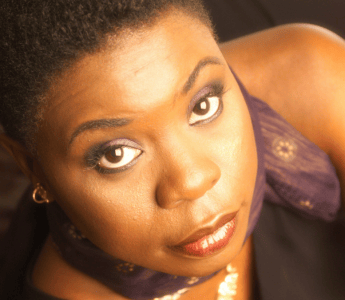
Eugen Bacon MA, MSc, PhD is an African Australian author of novels and collections. She’s a British Fantasy Award winner, a Victorian Premier’s Literary Award finalist, and a twice World Fantasy Award finalist. Eugen was announced in the honor list of the Otherwise Fellowships for ‘doing exciting work in gender and speculative fiction’. Danged Black Thing made the Otherwise Award Honor List as a ‘sharp collection of Afro-Surrealist work’, and was a 2024 Philip K Dick Award nominee. See more at eugenbacon.com.
Ahead of her exciting Literature Lesson on Peter Temple, Eugen answered some questions from our Marketing and Communications Officer, Sarah Giles, on inviting possibility into your work, her tenacious approach to prizes and the texts that have changed her.
What have you read/watched/listened to recently that has most inspired you to write?
I was always curious about the world and grew up reading African ‘how’ and ‘why’ stories: Why the crocodile lives in the water. How the zebra got her stripes. Why the hyena has two short legs… In school, we studied Margaret Ogola, Ngũgĩ wa Thiong’o, Camara Laye, Wole Soyinka and Chinua Achebe.
Then I discovered Toni Morrison, the first African American woman to receive the Nobel Prize (1993) in literature. The first book I read was her Pulitzer Prize winning Beloved, and I was enchanted with the beauty of her language, the longing in her characters. It was longing that touched me inside. I bought and read Tar Baby, Jazz, Sula, Song of Solomon… and I knew that I wanted to write like that. Morrison’s revolutionary and most defining literary act was writing for black readers about black people. She taught me to see myself in the text. This was the ilk of writer I wanted to become—one completely at home with her stories.
As a writer of speculative fiction, what are your top tips for writers interested in experimenting with this genre?
In my book Writing Speculative Fiction, I talk about the playfulness of text. Speculative fiction is a playground of limitless possibilities, no matter how sombre the theme. I invite anyone interested in this genre to find affection in deviants. As I say in my book: ‘Loosen up, frolic in the sand of an upside-down world where the tide washes out and fishermen in hovercrafts cast nets to the sea, and the silhouette of a tall palm tree, its mop of leaves facing down against a melon sky, reaches you so high in your dreams.’ Learn through the influences of others and find a safe space to interrogate your curiosities. Research diligently, know your trusted readers who can help bring the work to its best form. Most of all, find pleasure in the text.
You are such a prolific writer. How do you schedule your writing time in order to achieve so much?
I’m very focused. I finish what I start. Writing doesn’t mean finding a three-hour slot in my day for a stint of continuous writing. I write as I go, sometimes in my head. Scraps everywhere, notes to the self. Swimming is a creative space—lap after lap, a character, an incident, a dialogue shapes itself. I hear people say, ‘Oh, I have five books on the go, none of them finished yet. I’ve been writing them for years!’ I can’t work like this. I finish what I start—that’s my secret.
What advice would you give to writers who are anxious about submitting their work for publication, awards or prizes?
Let us place a writer as being in a fragile place, one that is also sacred. There’s emotional attachment to a creation; equate advising a writer that their work is not good enough to telling a mother that her baby is ugly. But to be published, the writer must, inevitably, give others entry to their precious world. It takes courage and the right preparation. Give your work every best shot, because sometimes all you get is the one shot.
Research your characters. Hone your storyline. Edit, edit, edit. Know your trusted peers—open-minded mentors who recommend what to advance, highlight what works well, who stir you to a convincing output. Once you have confidence in your work, it will never matter who says the baby is ugly. Because you’ll know they’re not your right readers.
It’s a catch-22: to accept your work, publishers want to see what you’ve published. So finish those projects. Submit them for publication. Don’t take rejections personally. And know that awards are your friends. There’s no guarantee that you’ll win. But a longlist or a shortlist is another belt in your portfolio. You never know who’s noticing.
You are delivering the first in a series of Literature Lessons with Writers Victoria, what can attendees expect from your session on Peter Temple?
Peter Temple is one of the writers I see as an invisible mentor. His writing not only focuses on main characters but also takes special care with secondary or casual ones. His dialogue is a knife-edge. In his cross-genre novel Truth that won the 2010 Miles Franklin Literary Award, he disorients the reader with ‘multiple plots and elliptical exchanges’, as the judging panel put it. His narrative is perpetually arresting—I feel enthralment reading him, spellbound. In Literature Lessons, we’ll look at his novels Truth and An Iron Rose, a classic, revisit them together and rediscover what makes Temple so special as a novel writer.
Places are still available for Eugen’s Literature Lesson. Members of Writers Victoria receive up to 37% off the full price of all clinics, workshops, seminars and courses. Writers experiencing financial and social barriers to developing their skills are encouraged to apply to The Writers Victoria Fund for subsidised attendance at workshops and clinics.
